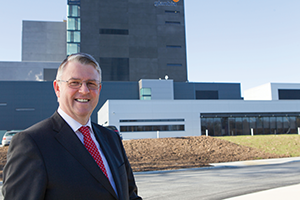Glanbia looks to the future with confidence
Post-quota, milk supplies to Glanbia are on the rise.
After 31 years of constraint, the shackles of milk quota were finally removed from the Irish dairy industry on 1 April. Irish farmers are taking full advantage, with forecasts of rapid growth proving accurate. In the first three months of the new post-quota era, milk supplies to Ireland’s largest dairy processor, Glanbia, were 16 per cent ahead of the same period last year.
Dairy farmers in Ireland supply Glanbia Ingredients Ireland (GII), which is a 60:40 joint venture between the farmer owned Glanbia Co-Operative Society Ltd and the Irish Stock Exchange listed Glanbia plc. GII is the largest dairy company in Ireland, collecting milk from 4,800 dairy farmers in 21 counties.
While Kilkenny based Glanbia plc is a global operation with a market value of over €5.5 billion, GII is a business with significant scale in its own right. Employing 700 people, it is the number one European producer of enriched milk powders and the third largest indigenous Irish exporter. The products produced at the company’s five Irish sites are exported to 60 countries around the world.
GII’s Irish plants have benefitted from a €235 million investment programme in recent years. The company’s flagship is a new €185 million greenfield dairy plant opened this year at Belview in south Kilkenny. This was the first greenfield primary dairy processing plant opened in Ireland since the early 1970s. Significant investment has also taken place at the company’s existing facilities at Ballyragget in County Kilkenny, Virginia in County Cavan and Wexford Creameries in Wexford town.
As well as physical plants to process increasing volumes of fresh Irish milk, GII is also investing in moving up the value chain. The company’s Chief Executive, Jim Bergin, explained that the company is focusing on four nutritional platforms – infant nutrition, sports nutrition, clinical nutrition and affordable nutrition.
Irish farmers and Glanbia are now competing against powerful competitors from strong exporting countries that include New Zealand, the United States, Holland, France and Germany. With total national milk production of just 5.6 billion litres, Ireland is small by international comparison – the USA is fast approaching annual production of 100 billion litres.
In order to compete in this international arena, local farmers are playing to their strengths. The vast majority of our farmers utilise a grass based model of milk production that capitalises on the Irish climate’s ability to grow large quantities of our cheapest feed source, grass. Today, around 1.1 million dairy cows are milked by 18,000 professional dairy farmers, with well-educated and ambitious new entrants joining the business each year.
Extra milk requires more cows, which prompts questions about the environmental sustainability of dairy expansion against a serious climate change backdrop. The Chief Executive of GII, Jim Bergin, is passionate about sustainability and describes it as “our licence to grow”.
He explained that it’s “an ongoing and significant challenge to balance the impact of increased dairy production with the need to cut our overall emissions. However we believe that through integration of Agriculture with LUCF (land use change and forestry), allowing for offset of emissions, along with comprehensive initiatives on farm such as Origin Green and Glanbia’s Open Source® programme, that this can be achieved.”
He pointed out that Ireland’s grass-based dairy production system ranks as one of the most carbon-efficient internationally. “It’s an environment that’s naturally suited to sustainable farming – something that Glanbia Ingredients Ireland (GII) is committed to protecting,” he said.
GII is seen internationally as a leader in sustainability, with farmers assisted by a dedicated team of advisors who provide one-to-one support and insight in the areas of milk quality, sustainable farming and animal welfare. As part of GII’s unique Open Source Programme, the company is ensuring that every one of the company’s farmer suppliers are independently audited under an internationally accredited certification process.






